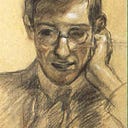Dear Alexander, at the beginning I thought that your argument is just wrong, but, having read all the article, it's plain gibberish.
First of all, the fact that we operate with 2 and -2 does not show any "indetereminacy" or handling a contradiction. Those two numbers do not contradict themselves in any meaningful sense. The fact that a function has two roots is not contradictory. Your example is unintelligible at best and wrong at worst.
Secondly, going to the essence of your discussion, Wittgenstein did not repudiate Goedel's results merely on the "empiricistic" grounds. He did not say that they were senseless because they are not verifiable with reality. Then he would be just a superficial thinker (which, my goodness, he was not!). He did so because he wanted to show something more striking than a philisiphical argument or a neat point: notoriously in the "Remarks" and his "Lectures on the Foundations of Mathematics" did he argued against Platonism, Godel's "logische Kunststuecke" and in general any sort of unjustified usage of language BECAUSE there was, he believed, an ethical problem with those. He believed that Godel's result was *senseless* because it broke the rules of language in a dishonest act of playing with self-reference. NOT because there was no justification in physical reality or whatever. Moreover, no-where did Wittgenstein point to such a reason for rejection, so you are basically imposing your interpretation, and that on the quotes taken out of context. Wittgenstein believed that it was a curious and serious question why people are so damn scared of contradiction and in his work he just pointed to the possibility of facing this fear. Surely he did not combat Godel for theoretical reasons.
On a closing note I might add that what you call a "liar paradox" here is no paradox at all. It is a verison of what is widely known as Epimenides paradox. But it's no paradox. If it's true then indeed we arrive at a contradiction. But if the statement is false, than, logically, it means that there are some things that I say that are true. No paradox here.
